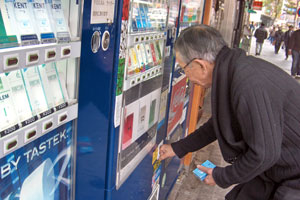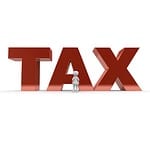Some anti-tobacco campaigners and economists in Bangladesh have said that the withdrawal of a 25 percent customs duty on leaf-tobacco exports would encourage growers to cultivate more tobacco, despite the health and environmental hazards the crop poses, according to a story in The Dhaka Tribune.
In his recent budget speech, Finance Minister A.M.A. Muhith said he had proposed the withdrawal of the customs duty in order ‘to reduce domestic consumption by encouraging exports’.
However, anti-tobacco campaigners and economists condemned the move, expressing fears that farmers would put more focus on tobacco cultivation and eschew other crops if the customs duty were removed.
“When Bangladesh is supposed to be reducing the production of tobacco, it is giving incentives to increase production by withdrawing duties on exports instead,” Dr. M Asaduzzaman, distinguished fellow of the Bangladesh Institute of Development Studies, reportedly told the Tribune.
If the customs duty were withdrawn, farmers would get better prices and would be encouraged to cultivate more tobacco while shifting away from other crops, he added.
The economist said also that if the government wanted to reduce domestic tobacco consumption, it needed to take stricter measures than incentivizing exports.
Meanwhile, A.B.M. Zubair, executive director of the anti-tobacco NGO, Progga, said Bangladesh’s food security would come under threat if the duty were removed, not only because farmers might shift away from food crops, but also because tobacco cultivation had a negative impact on the fertility of the soil and the environment.
The Tribune reported that, according to a report by the World Health Organization titled Tobacco and its environmental impact: an overview, tobacco cultivation is associated with land degradation or desertification in the form of soil erosion, reduced soil fertility and productivity, and the disruption of water cycles.
The report said that cultivation and curing of tobacco were both direct causes of deforestation, because forests were cleared for tobacco plantations and wood was burned to cure the leaves.
Moreover, chemicals used to control a weed commonly found in the tobacco fields of Bangladesh were found to have been polluting aquatic environments and destroying fish supplies, as well as soil organisms needed to maintain soil health.
Farming communities were exposed to health risks caused by the chemical pollution of their environment because tobacco growers used abnormal fertilizers and chemicals to attain higher yields.
Category: Taxation

Support for leaf export levy

Price increase in Japan
Philip Morris Japan said yesterday that it would increase the prices of all 86 cigarette products it sells in the country on October 1, on which date tobacco tax is due to rise by ¥1 per cigarette, according to a story in The Japan Times.
The company said it would increase the price of packs of 10 cigarettes by ¥20 and that of packs of 20 cigarettes by ¥50.
For its flagship Marlboro brand, the price of most packs of 20 will be increased to ¥520 from the current ¥470.
The price increases are subject to approval from the Finance Ministry.
The decision to raise cigarette prices above that required by the tax increase had been made after a comprehensive assessment of the market environment, the company said.
The company is considering also a price revision for its iQOS heat-not-burn tobacco products in line with the tax increase.
Commitment questioned
Anti-tobacco campaigners in Bangladesh said yesterday that the Government’s proposed budget for 2018-19 lacked initiatives to realize the prime minister’s commitment to a tobacco-free country by 2040, according to a story in The Daily Star.
In a joint statement, the anti-tobacco organization, Progga, and the Anti Tobacco Media Alliance (ATMA) said the finance minister in his budget speech had discussed plans to ensure a tobacco-free Bangladesh by 2041. ‘Ironically, the budget he has proposed bears no sign of that intention,’ the statement said.
The minister had talked about bringing down the total number of price slabs but had kept the existing four-price-slab system intact in the proposed budget.
The government had left the prices of packs of 10 ‘top-shelf’ cigarettes untouched at Tk101 for three consecutive years, including in the proposed budget for 2018-19.
This reflected a blatant disregard for public health on the policymakers’ part because cigarettes were getting cheaper each year, given the increase in per capita national income during the past three years.
In the proposed budget, the price of a pack of 10 high-tier cigarettes would increase from Tk70 to Tk75; the price of a pack of 10 medium-tier cigarettes would increase from Tk45 to Tk48; and the price of a pack of 10 low-tier cigarettes would increase from Tk27 to Tk32. The price of 25 non-filtered bidis would remain unchanged at Tk12.5.
Reforming in Cambodia
Japan Tobacco International (JTI), one of Cambodia’s biggest cigarette distributors, has said that it is rejoining the Association of the Tobacco Industry of Cambodia (ATIC) following a recent ATIC promise to combat illegal cigarette sales and fake products, according to a story in The Phnom Penh Post.
The company left the association in the middle of 2016.
The ATIC said it had organized an annual meeting last week and decided to regroup to tackle issues that had put the industry at risk, including illegal cigarette sales, fake products, packs with non-pictorial health warnings, and products which did not have legitimate tax stamps.
Cormac O’Rourke, the general manager of JTI Cambodia, which distributes Camel, Winston and Mevius brands, said his company’s rejoining of ATIC would raise the commitment of all members and players to adhere to the relevant laws and regulations that benefitted the entire industry.
“The illegal trade of tobacco products is, by far, the industry’s biggest challenge,” he was quoted as saying. “It is severely damaging tobacco companies, the industry, public health agenda and the national economy.”
In July 2016, JTI ended its affiliation with the ATIC because, it said, the association had failed to create a ‘level playing field’ by allowing unmarked imported cigarettes to flood the market, despite legislation requiring tobacco packaging to carry graphic images and warning labels.
ATIC President Matt Naumann said the group had decided to make major reforms to its structure and direction to drive compliance in the tobacco sector for a ‘One Industry’ standard.
The recent reform had led to changes in membership, he added. The Viniton Group had left the association while JTI had rejoined.
The ATIC now comprises Philip Morris International, Houtraco, British American Tobacco Cambodia and JTI (Cambodia) as official members.
E-cigs attracting excise
Indonesia is due to impose an excise tax of 57 percent on certain e-liquids from July 1, according to a story by Tabita Diela for Reuters.
The tax is reportedly being imposed as part of efforts to curb tobacco-product consumption.
Sunaryo, an official with the Customs and Excise Office, was quoted as saying the e-liquid excise tax would be introduced as an expansion of the current excise tax rules governing tobacco products.
Tobacco accounts for the bulk of Indonesia’s excise taxes, which comprise a significant source of government revenue.
Sunaryo apparently said the new excise tax would apply only to e-liquids that contained “traces of tobacco plants”.
There are about 300 ‘unsupervised’ e-liquid makers in Indonesia, producing various liquids to supply more than 4,000 vape stores and 900,000 vapers, the customs office estimates.
Tax rises not working
Australia is one of the most expensive countries in which to buy cigarettes, with retail prices set to reach nearly A$40 for a 30-piece pack after this year’s Budget, according to a Nova Network story quoting the federal Treasurer Scott Morrison.
September 1 is scheduled to see the imposition of the second of four planned, consecutive 12.5 percent tobacco excise increases.
The September increase will see the price of a 30-piece pack of cigarettes increase by about A$3. When the first of the increase was imposed last year, the price of a pack of 30 Winfield Blues rose from A$32.50 to A$35.20.
But it seems that high prices do little to convince smokers to quit.
According to the Nova Network story, Australia saw an 0.2 percent drop in smokers during a recent three-year period, which saw also cigarettes being sold in standardized packs.
Meanwhile, a Channel 7 News story had it that the number of people giving up smoking in Australia had slowed in recent years despite the country’s having the highest-priced cigarettes in the world.
England, the US, Canada, Norway and Iceland were said to be among a long list of western countries that were seeing their citizens kick the habit at a faster rate.
The Channel 7 story quoted Colin Mendelsohn, a tobacco treatment specialist and associate professor in the School of Public Health and Community Medicine at the University of New South Wales, as saying that “high prices simply aren’t working anymore”.
Call for 'sin tax' repeal
Excise taxes should be repealed in the US because they harm the poor disproportionately by requiring them to pay a higher portion of their incomes in taxes, say members of the Project 21 black leadership network.
In its Blueprint for a Better Deal for Black America, Project 21 calls for repealing both gasoline taxes and ‘sin taxes’ on items such as tobacco, non-tobacco nicotine products, alcohol, soda, and fatty foods.
This, it says, would reduce the burden on those who were economically at risk.
“With fuel prices on the rise, repealing taxes that can add up to 60 cents per gallon of gasoline would give much-needed relief for the poor who are hurt the most by rising prices,” said Project 21 member Rich Holt, a political consultant who also co-chairs the Ohio Center-Right Coalition meeting. “For the working poor who must drive to work, cutting fuel consumption simply isn’t an option. Each additional dollar spent on gasoline is a dollar that can’t be spent on food, medical care and other necessities.”
Project 21’s blueprint says that ‘sin taxes’ on items including fatty foods, sodas, alcohol, tobacco and non-tobacco nicotine products such as e-cigarettes are less about promoting public health than about generating government revenue. It cites a report by the UK’s Adam Smith Institute that found: ‘Sin taxes are blunt instruments which are more likely to deter moderate users than abusers’.
The Adam Smith Institute noted also that the bottom 10 percent of wage earners spent four times as much on taxes on cigarettes than did the top 10 percent; that the bottom 20 percent of wage earners spent nearly twice as much in alcohol taxes than did the top 20 percent; and that the bottom 20 percent spent seven times as much in taxes on fatty foods than did the top 20 percent.
“Federal and state excise taxes combined can add an average of $179 per year to a family’s gasoline bills,” said Project 21 co-chairman Stacy Washington, a nationally-syndicated talk radio host on the American Family Radio and Urban Family Talk networks. “While this might have little impact on wealthy and solidly middle-class drivers, it can have a devastating impact on those living near the poverty line.
“Add sin taxes on tobacco, alcohol and fatty foods and there is a heavy toll imposed on poor Americans, who are disproportionately minorities.
“Project 21 is calling for government to get off the backs of our poorest citizens by repealing these regressive taxes now.”E-cigs, not taxes, work
The imposition of higher excise taxes on tobacco products does not necessarily lower smoking rates, but substituting electronic cigarettes for traditional cigarettes does, according to a story in The Philippine Daily Inquirer quoting the representative of a pro-nicotine alliance.
Nancy Sutthoff, spokesperson for the International Network of Nicotine Consumer Organizations, was recently in the Philippines to address the first Summit on Harm Reduction, held at the Sulo Riviera Hotel in Quezon City.
Citing the case of her own country, New Zealand, Sutthoff said the government had increased tobacco excise by 10 percent every six months.
“Our smoking rate has yet to go down,” she said.
Sutthoff, who is also co-founder and co-director of the Aotearoa Vapers Community Advocacy (Avca) in New Zealand, said Avca had launched the Vape It Forward program in 2017 to support smokers who wanted to quit smoking by switching to vaping.
Eighteen months after its launch, the VIF program had delivered an 88-percent success rate.
Nigeria raises excise
New excise duties on tobacco and alcoholic beverages are due to take effect in Nigeria today, according to a story in The Premier Times.
The Minister of Finance, Kemi Adeosun, in March announced that the President, Muhammadu Buhari, had granted a 90-day period of grace to manufacturers of the products concerned.
Adeosun said the imposition of the new excise duties would be spread over three years, from 2018 to 2020 in order to moderate the impact of the price increases.
She said that the increases were aimed at raising government revenues, though she added that they would also reduce tobacco-related diseases and alcohol abuse.
The Times reported that the new duty rate on tobacco was a combination of the existing ad-valorem base rate and a specific element. So, in addition to the 20 percent ad-valorem rate, this year each cigarette would be the subject of a one-naira specific rate – N20 per pack of 20.
The specific element is due to increase next year to N2 per cigarette, or N40 per pack; and in 2020 to N2.90 per cigarette or N58 per pack.
The director-general of the Consumer Protection Council (CPC), Babatunde Irukera, said the decision to increase excise duties was consistent with prevailing global practices.
Meanwhile, Akinbode Oluwafemi, the deputy executive director, Environmental Rights Action of Earth Nigeria, described the decision to increase the excise duty on tobacco as praise-worthy.
However, the president of the Manufacturers Association of Nigeria, Frank Jacobs, expressed fear that the proposed hike might lead to the closure of factories and loss of jobs.
Price decrease denied
Malaysia’s Health Ministry has decided to maintain the price of cigarettes following the abolishing of the goods and services tax (GST) today, June 1, according to a story in The Star quoting the Health Minister, Dr. Dzulkefly Ahmad.
“There will not be any decrease in price,” he said.
“That is our commitment to ensure that the prohibitive price is going to be one of the ways to prevent the use of cigarettes.”
Asked if other ministries had given their support to his ministry, Dzulkefly said he didn’t think this would be a problem. “We are almost on the same page on that one,” he said. “I can vouch on that.”
Currently, the prices of 20-piece packs of cigarettes range from RM12 to RM17, the Star reported. ‘With the zero-rated GST, the price of things will drop, including cigarettes, until the implementation of sales and services tax (SST),’ it said.
This was a huge window of opportunity for new smokers to pick up the habit, for current smokers to stock up, and for ex-smokers to fall off the wagon, a source familiar with the issue was quoted as saying.
To maintain the price of cigarettes, there was a need to increase excise tax, of which Malaysia was way below the minimum level recommended by the World Health Organization.









